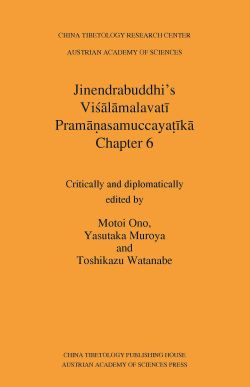


Jinendrabuddhi’s (approx. 710–770 CE) Pramanasamuccayatika is a detailed commentary on Dignaga’s (approx. 480–540) Pramanasamuccaya, the text that traditionally marked the foundation of the Buddhist school of logic and epistemology in India. The current volume presents a diplomatic and critical Sanskrit edition of the sixth and final chapter of Jinendrabuddhi’s commentary, where the focus is the theory of “false rejoinders”, a dialectical question rarely treated by Indian Buddhist logicians later than the seventh century. Jinendrabuddhi’s voluminous commentary is thus a highly important source, not only for research on the development of the Buddhist school of logic, but also on Indian philosophy in general. The diplomatic edition presented in the current volume is based on a single extant Sanskrit manuscript of the Pramanasamuccayatika kept in Lhasa, Tibet. Access to copies of this manuscript has been made available only recently. To produce the critical edition, also the Tibetan translation of Jinendrabuddhi’s commentary and other relevant materials were taken into consideration. Not only does the critically edited text enable a more exact interpretation of Dignaga’s theory of “false rejoinders” than has hitherto been possible, it also illuminates details regarding the history of the Indian Buddhist tradition of dialectics prior to Dignaga’s time. Editions of the first two of the Pramanasamuccayatika’s six chapters have already been published, in 2005 and 2012, in the current series “Sanskrit Texts from the Tibetan Autonomous Region” (STTAR).
Printed with the support of the Austrian Science Fund (FWF)

…
Die Pramanasamuccayatika Jinendrabuddhis (ca. 710–770 n. Chr.) ist ein ausführlicher Kommentar zum Pramanasamuccaya Dignagas (ca. 480–540 n. Chr.), der traditionell als Ausgangstext der buddhistischen Schule der Logik und Epistemologie in Indien betrachtet wird. Der vorliegende Band beinhaltet eine diplomatische und kritische Ausgabe des Sanskrittexts des sechsten und letzten Kapitels dieses Kommentars, in dessen Mittelpunkt die Theorie der falschen Einwände steht, die nach dem siebten Jahrhundert kaum noch von buddhistischen Logikern in Indien diskutiert wurde. Jinendrabuddhis umfangreicher Kommentar stellt daher nicht nur für die Forschung der buddhistischen logischen Schule, sondern auch für die indische Philosophie im Allgemeinen eine sehr wichtige Quelle dar. Die in diesem Band vorgelegte diplomatische Edition basiert auf dem einzigen verfügbaren Sanskrit-Manuskript der Pramanasamuccayatika, das sich in Lhasa, Tibet, befindet. Der Zugang zu Kopien dieses Manuskripts wurde erst in der letzten Zeit ermöglicht. Bei der Erstellung der kritischen Edition wurden zusätzlich die tibetische Übersetzung sowie weitere relevante Materialien herangezogen. Der kritisch edierte Sanskrittext des Kommentars ermöglicht nicht nur eine präzisere Interpretation der Theorie Dignagas bezüglich der falschen Einwände, sondern beleuchtet auch Details der Geschichte der buddhistischen Tradition der indischen Dialektik vor der Zeit Dignagas. Die Ausgaben der ersten zwei von den insgesamt sechs Kapiteln der Pramanasamuccayatika wurden 2005 und 2012 ebenso in der Reihe „Sanskrit Texts from the Tibetan Autonomous Region“ (STTAR) veröffentlicht.
2023
978-3-7001-9168-1
978-3-7001-9169-8
Diese Publikation ist lizenziert unter der Creative-Commons-Lizenz Namensnennung 4.0:
CC BY 4.0